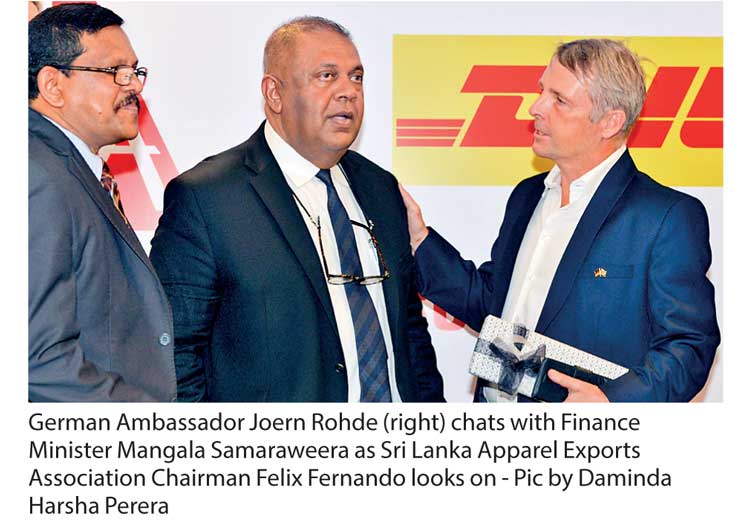Saturday Feb 21, 2026
Saturday Feb 21, 2026
Wednesday, 29 November 2017 00:00 - - {{hitsCtrl.values.hits}}

By Uditha Jayasinghe
Sri Lankan apparel exports are likely to receive a significant boost through a European Union (EU) decision to allow the sourcing of fabric from Indonesia, Thailand and Malaysia as the industry aims to hit $ 5 billion in earnings this year, a top official said yesterday.
Sri Lanka Apparel Exporters Association Chairman Felix Fernando, speaking at the 35th Annual General Meeting, which was also attended by Finance Minister Mangala Samaraweera, noted that the industry was “grateful” and “delighted” by the restoration of GSP+.
“To maximise the use of GSP+, SLAEA with JAAF requested the Department of Commerce to explore the possibilities of indentifying the possibility of making a joint request to the EU between Sri Lanka and selected ASEAN countries to agree on cross regional accumulation for fabric. We reliably understand that the EU has agreed to grant this benefit and we have selected Indonesia, Thailand and Malaysia to start with. It is our sincere wish that the Government will support this effort as it will give a huge advantage to apparel exporters,” he told the gathering.
From 2004 to 2011 apparel exports grew by 50% but over the last six years they have stagnated due to the loss of GSP+, noted Fernando. However, in July, August and September 2017 exports have been robust and it is clear that GSP+ is having an effect. Overall exports are expected to surpass the $ 5 billion mark for the first time due to the boost given by preferential access to the European Union, predicted Fernando. As the industry will have GSP+ for the full year of 2018, an additional increase is expected.
“With the uncertainties around Brexit, Sri Lankan authorities need to talk with their UK counterparts as we are not sure if both parties will continue to provide the same trade facilities. Due to these uncertainties it is imperative that we consider other EU countries, especially Germany, where our presence is limited.”
He also called for assistance to link Sri Lanka’s apparel industry with the fashion and import industries in Germany to boost engagement and increase exports.
As per the proposals outlined in Budget 2018, the Government has realised the limitations in the domestic market and has aimed to position Sri Lanka as an export-oriented hub at the centre of the Indian Ocean. Fernando applauded Government efforts to draw up a national export strategy and was positive of the engagement with different sectors, including apparel. Fernando expressed hope that once approved, the new policy would continue to facilitate trade by reducing paperwork and improving logistics and other support services.
“One complaint all exporters had was the decision taken by the Government to abolish the SVAT system and we are thankful to the Minister for yielding to our concerns,” he said. Introduction of new legislation to replace the Customs Ordinance, liberalise trade, acceptance of digital signatures and automation of document processes were applauded by Fernando as noteworthy proposals in Budget 2018. The Rs. 15 billion earmarked in the Budget for entrepreneurs was also viewed positively by Fernando.
“In the implementation strategy it is important to define how SMEs can obtain funds for expansion and to have monitoring committees established to indentify action, which would enable them to monitor progress.”
He also hailed shipping liberalisation and said the SLAEA and JAAF publicly support Finance Minister Mangala Samaraweera’s stand. Amendments to the Shop and Office Act were also praised.
“Sri Lanka has enough people to work but female participation is low and unless female participation is increased Sri Lanka will not be able to achieve its development goals. Why do workers stay away? Even though they can earn better wages, the image projected about workers in industries is low. Our society in general does not appreciate the hard work done by them and degrades them as ‘garment workers’ or ‘Juki girls’ and this is very sad.”
An image-building effort is already underway and support from the Minister was also requested by Fernando.